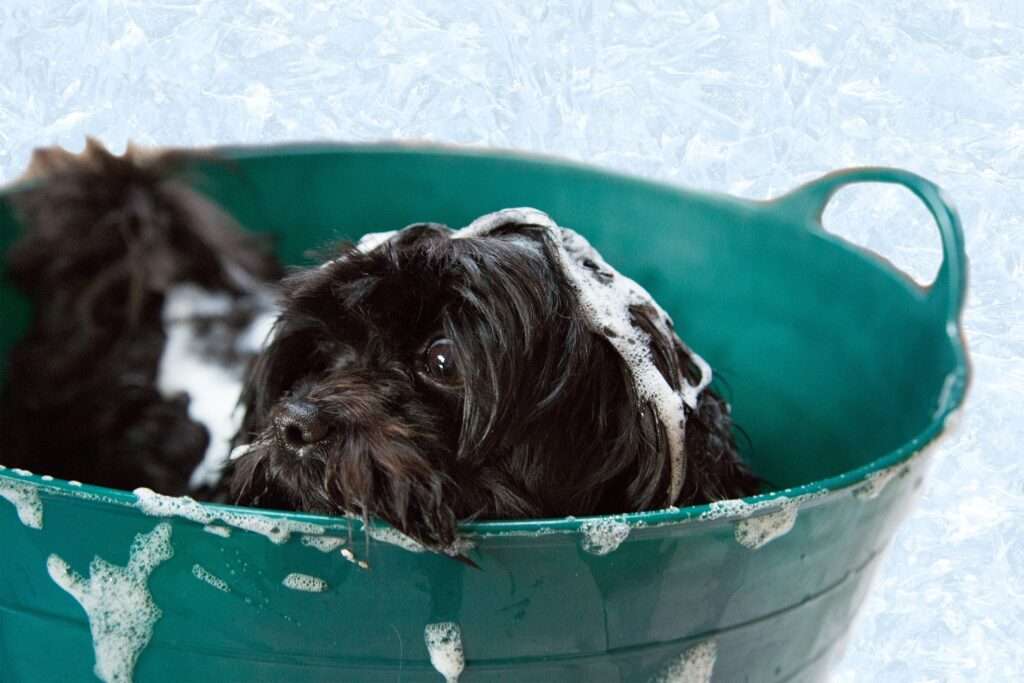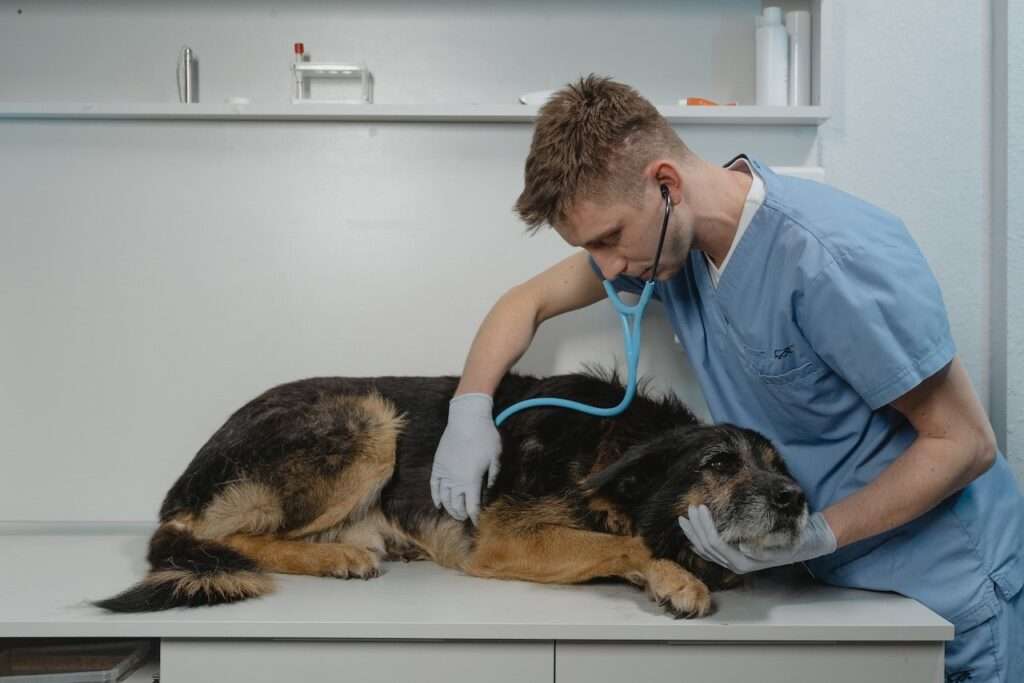How to Get Rid of Fishy Smell from Dog? The Fast, Natural, and Highly Effective Solutions!
As dog owners, we adore our furry companions for their playful antics, loyal nature, and unconditional love. However, there are moments when an unpleasant odor wafts from our four-legged friends, leaving us wondering, “Why does my dog smell fishy?”
At BarkLikeMeow, we understand the importance of maintaining your dog’s hygiene and ensuring their overall well-being. In this ultimate guide, we will delve into the depths of the fishy smell mystery and provide you with effective solutions to banish that unwelcome aroma for good!
Understanding the Fishy Smell in Dogs

Your dog’s well-being is a top priority, and when an unexpected fishy smell arises, it’s essential to investigate the underlying cause. In this section, we dive deeper into identifying the root cause of the fishy smell in dogs. By assessing your dog’s skin and coat health, examining potential health issues, and considering external factors, we can unravel the mystery behind this odor.
Identifying the underlying cause of the fishy smell:
- Assessing your dog’s skin and coat health: When it comes to combating a fishy odor, it’s crucial to examine your dog’s skin and coat health. A healthy coat should be shiny, soft, and free of any excessive oiliness. If you notice dry patches, flakiness, or redness, it may indicate an underlying issue contributing to the fishy smell. Regularly check for signs of irritation or inflammation to catch any potential problems early on.
- Examining potential health issues that may cause the odor: Sometimes, a fishy smell emanating from your dog may be an indication of an underlying health issue. Skin infections, allergies, or even anal gland problems can manifest as an unpleasant odor. By observing your dog’s behavior, monitoring any changes in their eating habits or energy levels, and paying attention to other associated symptoms, you can gather valuable clues to help identify the root cause.
- Considering external factors that contribute to the smell: While health issues play a significant role, external factors can also contribute to that fishy scent. Your dog’s daily activities, exposure to certain environments, or contact with fishy substances can leave a lingering odor on their fur. It’s essential to consider these external factors and evaluate your dog’s recent interactions to get a better understanding of the potential sources of the fishy smell.
While understanding the common causes of fishy odors is crucial, it is equally important to identify the specific cause affecting your dog. Observing your dog’s behavior, paying attention to accompanying symptoms, and seeking professional guidance can help pinpoint the root cause of the fishy smell.
By addressing the underlying issue, you can effectively eliminate the odor and improve your dog’s overall well-being. Stay tuned for the next section, where we will explore preventive measures and maintenance routines to keep your dog smelling fresh and delightful. Remember, a healthy and odor-free dog is a happy dog!
Prevention and Maintenance
Prevention is key when it comes to keeping our furry friends smelling their best. By implementing regular grooming practices and providing a balanced diet, you can proactively combat fishy odors in your dog. In this section, we will explore essential preventive measures and maintenance routines to ensure your dog stays fresh and delightful.
Regular grooming practices:
- Brushing your dog’s coat: Brushing your dog’s coat not only helps remove loose hair and debris but also stimulates the production of natural oils that keep their coat healthy. Regular brushing promotes good circulation and reduces the risk of skin issues that may contribute to fishy odors.
- Bathing frequency and appropriate products: While baths are necessary for maintaining cleanliness, excessive bathing can strip away the natural oils in your dog’s skin, leading to dryness and potential odor problems. Consult with your veterinarian to determine the appropriate bathing frequency and use gentle, dog-specific shampoos that are formulated to maintain a healthy pH balance.
- Dental hygiene: Bad breath can add to the overall odor concerns in dogs. Implementing a dental care routine, including regular toothbrushing with dog-friendly toothpaste and providing dental chews or treats, can help prevent dental issues that may contribute to unpleasant smells.
Diet and nutrition:
- Choosing high-quality dog food: Opt for high-quality dog food that contains essential nutrients, vitamins, and minerals to support your dog’s overall health. Look for products that have real meat as the primary ingredient and avoid those with artificial additives or fillers. A balanced diet can improve your dog’s coat condition and reduce the likelihood of odors.
- Incorporating omega-3 fatty acids: Omega-3 fatty acids, commonly found in fish oil supplements, can promote healthy skin and coat, reducing the chances of skin issues that may contribute to fishy smells. Consult with your veterinarian regarding the appropriate dosage and supplementation options for your dog.
- Avoiding common dietary triggers: Certain foods can contribute to unpleasant body odors in dogs. Avoid feeding your dog table scraps or foods that contain strong-smelling ingredients like onions or garlic. Additionally, some dogs may have specific dietary sensitivities or allergies that can result in odorous symptoms. Consult with your veterinarian to determine if a special diet is necessary for your dog.
Remedies for Fishy Smell

We understand that sometimes despite taking preventive measures, your dog may still experience occasional fishy odors. In this section, we will explore various remedies and solutions that can provide immediate relief and eliminate the unwanted smell. From home remedies to professional treatments, we’ve got you covered!
Home remedies for immediate relief:
- Herbal rinses or sprays: Herbal rinses or sprays made with natural ingredients like chamomile, lavender, or rosemary can help neutralize odors and soothe your dog’s skin. These solutions can be applied after bathing or between baths to keep your dog smelling fresh.
- Baking soda and water paste: Baking soda has natural deodorizing properties. Mix it with water to form a paste and apply it to your dog’s coat, focusing on areas that emit a fishy smell. Let it sit for a few minutes before rinsing thoroughly. Baking soda helps absorb odors, leaving your dog smelling clean.
- Apple cider vinegar solution: Dilute apple cider vinegar with water and use it as a final rinse after bathing your dog. The acidity of vinegar helps restore the natural pH balance of your dog’s skin, reducing odors and leaving a fresh scent.
Natural and Holistic Approaches
Often, many pet owners may prefer natural and holistic approaches to address their dog’s fishy smell. In this section, we will explore a range of natural remedies and holistic methods that can help eliminate odors while promoting your dog’s overall well-being. By embracing these approaches, you can ensure a fresh and delightful experience for both you and your furry friend.
Aromatherapy and essential oils:
- Safe essential oils for dogs: Certain essential oils have properties that can help neutralize odors and provide a pleasant scent. Oils like lavender, chamomile, and peppermint are generally safe for dogs when used properly. Remember to always dilute essential oils and consult with a veterinarian or certified aromatherapist before using them on your dog.
- Proper dilution and application techniques: Dilute essential oils with a carrier oil such as coconut or jojoba oil before applying them topically to your dog. Use a small amount and monitor your dog’s reaction. Additionally, you can use a diffuser to disperse essential oils in the air, creating a calming and refreshing atmosphere.
- Benefits and potential risks: Aromatherapy can have various benefits for dogs, including odor control, relaxation, and stress reduction. However, it’s important to be aware of potential risks, such as allergies or sensitivities. Always introduce essential oils gradually and observe your dog for any adverse reactions.
Herbal remedies and supplements:
- Calming herbs to reduce stress-related odors: Some dogs may develop fishy odors as a result of stress or anxiety. Herbs such as chamomile, valerian root, or passionflower can help promote relaxation and reduce stress-related odors. Consult with a holistic veterinarian to determine the appropriate herbs and dosages for your dog.
- Natural remedies for skin conditions: Skin conditions like yeast or bacterial infections can contribute to fishy smells. Herbs like calendula, aloe vera, or tea tree oil (used with caution and in diluted form) can offer soothing and healing properties for the skin. It’s important to consult with a veterinarian before using herbal remedies to ensure they are safe and appropriate for your dog’s specific condition.
- Probiotics for digestive health: Probiotics are beneficial bacteria that can support your dog’s digestive health. They can help maintain a balanced gut flora, reducing the likelihood of gastrointestinal issues that may cause fishy odors. Choose a high-quality probiotic supplement specifically formulated for dogs, and consult with your veterinarian regarding the appropriate dosage.
Maintaining a Clean and Fresh Environment
Keeping your dog’s environment clean is essential for maintaining a fresh and pleasant-smelling home. In this section, we will explore practical tips and techniques to ensure a clean and odor-free living space for you and your furry companion.
Cleaning your dog’s living areas:
- Washing bedding and toys: Regularly wash your dog’s bedding, blankets, and toys to remove dirt, hair, and any lingering odors. Follow the manufacturer’s instructions for proper cleaning methods, and use pet-safe detergents or natural alternatives.
- Regular vacuuming and floor cleaning: Vacuuming your home regularly helps remove pet hair, dander, and other particles that can contribute to odors. Pay special attention to areas where your dog spends the most time. Additionally, mop hard floors with pet-friendly cleaners to ensure a thorough clean.
- Eliminating odors with natural solutions: Natural odor-neutralizing agents like baking soda or activated charcoal can help absorb and eliminate unwanted smells. Sprinkle baking soda on carpets or upholstery, let it sit for a while, and then vacuum it up. Place activated charcoal in strategic locations to absorb odors.
Odor control methods for your home:
- Air purifiers and ventilation: Consider using air purifiers with HEPA filters to remove airborne particles and pet odors. Proper ventilation, such as opening windows or using fans, can also help circulate fresh air and reduce stagnant odors in your home.
- Odor-neutralizing sprays or candles: Choose pet-friendly odor-neutralizing sprays or candles that use natural ingredients like essential oils or enzymes to eliminate odors. These products can help freshen up your home without introducing harmful chemicals.
- Proper disposal of waste: Promptly and properly dispose of your dog’s waste to prevent lingering odors. Use poop bags when walking your dog and dispose of them in designated waste bins. If you have a backyard, regularly clean up and dispose of waste in a sanitary manner.
By incorporating these natural and holistic approaches while maintaining a clean environment, you can ensure a fresh and pleasant-smelling home for both you and your beloved dog. Stay tuned for the next parts of our guide, where we will discuss seeking professional help and dealing with persistent fishy smells.
Addressing Potential Health Issues
Common causes of fishy odor in dogs:
- Anal gland issues: Dogs possess anal glands that release a distinct scent. However, when these glands become impacted or infected, they can emit a fishy smell. This condition requires professional attention to alleviate discomfort and eliminate the odor.
- Urinary tract infections: Just like humans, dogs can develop urinary tract infections (UTIs) that cause an unpleasant odor. If your dog exhibits signs of discomfort while urinating, frequent urination, or cloudy urine, it’s essential to consult with a veterinarian for a proper diagnosis and treatment.
- Skin infections or allergies: Dogs with skin infections or allergies may experience excessive oil production or sebum buildup, resulting in a fishy odor. Common causes include yeast or bacterial infections, allergies to certain foods or environmental factors, and poor grooming practices.
- Diet-related factors: Believe it or not, your dog’s diet can play a significant role in their body odor. Consuming certain types of fish or fish-based dog foods can contribute to a fishy smell. Additionally, a poor-quality diet lacking essential nutrients can affect overall health, including skin and coat condition.
Seeking Professional Help
Sometimes professional guidance is necessary to address persistent fishy smells in your dog. In this section, we will explore the importance of veterinary guidance and the benefits of consulting professional dog trainers, behaviorists, and pet care providers. By seeking professional help, you can ensure the best care and solutions for your furry friend.
Importance of veterinary guidance:
- Proper diagnosis and treatment: Veterinarians are trained to identify and treat underlying health conditions that may contribute to fishy smells in dogs. They can perform necessary tests, such as skin scrapings or bloodwork, to determine the cause and recommend appropriate treatments.
- Health monitoring and prevention: Regular veterinary check-ups are essential for maintaining your dog’s overall health and detecting any potential issues early on. By partnering with your veterinarian, you can proactively address health concerns and prevent fishy odors from becoming a persistent problem.
Consulting a professional dog trainer or behaviorist:
- Behavioral assessments: Professional dog trainers and behaviorists can assess your dog’s behavior and identify any underlying anxiety or stress-related issues that may contribute to fishy smells. They can provide behavior modification techniques and training exercises to address these concerns.
- Proper grooming techniques: Trainers and behaviorists can guide you on the best grooming practices specific to your dog’s breed and individual needs. They can demonstrate proper brushing, bathing, and coat maintenance techniques to help reduce odors and promote a healthy coat.
Engaging professional pet sitters or dog walkers:
- Regular exercise and stimulation: Professional pet sitters or dog walkers can ensure that your dog receives regular exercise and mental stimulation. Adequate physical activity can help regulate your dog’s metabolism, improve overall health, and minimize potential body odor issues.
- Consistent care and routine: By engaging professional pet sitters or dog walkers, you can maintain a consistent care routine for your dog, including feeding schedules, potty breaks, and grooming. Consistency and routine contribute to a healthy and well-balanced lifestyle for your furry companion.
Dealing with Persistent Fishy Smell

Despite your best efforts, persistent fishy smells in your dog may require additional attention. In this section, we will explore the steps to take when dealing with persistent fishy smells, including when to consult a veterinarian, exploring underlying health issues, and available diagnostic tests and treatment options.
When to consult a veterinarian:
- Prolonged or worsening odor: If the fishy smell persists or intensifies despite your attempts to address it, it’s important to consult with a veterinarian. They can assess the situation, determine if there are underlying health issues, and provide appropriate treatment options.
- Accompanying symptoms: If your dog exhibits other symptoms such as excessive itching, redness, swelling, hair loss, or changes in appetite or behavior, it’s crucial to seek veterinary advice. These symptoms may indicate an underlying medical condition that requires attention.
Exploring underlying health issues:
- Diagnostic tests: Veterinarians may perform various diagnostic tests, such as skin scrapings, bacterial or fungal cultures, bloodwork, or urinalysis, to identify any underlying health issues contributing to the fishy smell. These tests can provide valuable insights into your dog’s condition.
- Allergies or skin conditions: Allergies, such as food allergies or environmental allergies, can cause skin irritation and fishy odors. Veterinary guidance can help determine if your dog has any allergies or skin conditions and recommend appropriate treatment options, including dietary changes or medication.
Diagnostic tests and treatment options:
- Skin treatments: Depending on the underlying cause, veterinarians may prescribe medicated shampoos, topical creams, or oral medications to address skin infections, allergies, or other conditions contributing to fishy odors. Follow their instructions carefully for optimal results.
- Dietary adjustments: In some cases, dietary changes may be recommended to address specific health issues or sensitivities. Your veterinarian can provide guidance on appropriate diet options and supplements to support your dog’s overall health and reduce odor problems.
Remember, addressing persistent fishy smells may require professional assistance. By seeking veterinary guidance and exploring underlying health issues, you can ensure the best care and solutions for your furry friend’s unique needs.
Additional Tips and Considerations
- Properly drying your dog after bathing: After bathing your dog, make sure to thoroughly dry them to prevent moisture from lingering in their coat. Moisture can create an environment for bacteria to thrive, leading to unpleasant odors. Use towels or a pet-safe blow dryer on a low heat setting to remove excess moisture. Pay special attention to areas that tend to retain moisture, such as the underarms and paws.
- Using odor-neutralizing products between baths: Between baths, you can use odor-neutralizing products designed for dogs to keep them smelling fresh. These products come in various forms, such as sprays, wipes, or powders, and can be applied to your dog’s coat to neutralize odors. Always choose products specifically formulated for dogs and avoid using human products, as they may contain ingredients that can be harmful to your furry friend.
- Regularly washing your dog’s bedding and toys: Your dog’s bedding and toys can harbor odors if not cleaned regularly. Ensure you wash your dog’s bedding, blankets, and any fabric toys they frequently use. Follow the manufacturer’s instructions for washing and drying to maintain their quality. Consider using pet-safe detergents and add odor-neutralizing agents, such as baking soda or vinegar, to eliminate lingering smells.
- Staying vigilant for changes in your dog’s odor: It’s important to stay vigilant and monitor any changes in your dog’s odor. If you notice a sudden or persistent change in their smell, despite following proper hygiene practices, it may be indicative of an underlying health issue. Contact your veterinarian if you have concerns or if the odor becomes severe or accompanied by other symptoms.
By implementing these preventive measures and following additional tips, you can ensure long-term odor control for your dog, providing a clean and pleasant environment for both you and your canine companion.
Conclusion
At BarkLikeMeow, we understand the importance of maintaining a fresh and delightful-smelling environment for both you and your beloved canine companion. From implementing preventive measures and embracing natural remedies to seeking professional help when needed, we have explored comprehensive solutions to tackle fishy smells in dogs.
By following regular grooming practices, providing a balanced diet, and incorporating natural and holistic approaches, you can minimize the occurrence of fishy odors in your dog. Additionally, maintaining a clean and fresh environment through proper cleaning techniques and odor control methods ensures a pleasant living space for everyone in your home.
However, it’s crucial to remember that persistent fishy smells may indicate underlying health issues, and consulting a veterinarian is essential for accurate diagnosis and appropriate treatment. Professional dog trainers, behaviorists, and pet care providers can also offer valuable guidance in addressing behavioral concerns and maintaining a consistent care routine for your furry friend.
Remember, every dog is unique, and it may take some trial and error to find the most effective solutions for your furry friend. Be patient, observant, and always prioritize their well-being. With love, care, and the right strategies, you can enjoy a delightful and odor-free companionship with your beloved dog.
Frequently Asked Questions
What are some common causes of fishy odor in dogs?
Some common causes of fishy odor in dogs include skin infections, anal gland problems, poor hygiene, and diet. It’s important to identify the underlying cause of the odor to effectively treat it.
How can I get rid of fishy smell from my dog?
There are several methods to get rid of fishy smell from your dog, including giving them a baking soda bath, wiping their bum with a soft, moist cloth, and seeking professional help if the odor persists. It’s important to consult with your veterinarian to determine the best course of action for your dog.
When should I consult a veterinarian for my dog’s fishy smell?
If your dog’s fishy smell persists despite your efforts to address it, or if your dog is experiencing other symptoms such as itching, redness, or discomfort, it’s important to consult with your veterinarian. They can help identify any underlying health issues and provide appropriate treatment.
Can I use human shampoo to bathe my dog and get rid of fishy smell?
No, you should not use human shampoo to bathe your dog as it can be too harsh for their skin and cause irritation. Instead, use a mild dog shampoo that is specifically formulated for their skin and coat.
Can fishy smell in dogs be a sign of a serious health issue?
Yes, fishy smell in dogs can be a sign of a serious health issue such as a bacterial or fungal skin infection, liver or kidney disease, or even cancer. It’s important to consult with your veterinarian to rule out any underlying health issues.
Can diet affect the smell of my dog’s coat?
Yes, diet can affect the smell of your dog’s coat. Feeding your dog a diet that is high in fatty acids and low in carbohydrates can help improve the smell of their coat and reduce fishy odor.
How often should I bathe my dog to prevent fishy smell?
The frequency of bathing your dog depends on their breed, coat type, and lifestyle. Generally, dogs should be bathed every 4-6 weeks, but if your dog is prone to skin infections or has a fishy odor, you may need to bathe them more frequently.
Can fishy smell in dogs be prevented?
Yes, fishy smell in dogs can be prevented by maintaining good hygiene, feeding them a healthy diet, and addressing any underlying health issues promptly. Regular grooming, such as brushing and trimming their coat, can also help prevent fishy odor.
Are there any natural remedies for getting rid of fishy smell in dogs?
Yes, there are several natural remedies for getting rid of fishy smell in dogs, including using apple cider vinegar, lemon juice, or baking soda. However, it’s important to consult with your veterinarian before using any home remedies on your dog.
Can fishy smell in dogs be a sign of anal gland problems?
Yes, fishy smell in dogs can be a sign of anal gland problems, which can occur when the glands become impacted or infected. If you suspect your dog has anal gland problems, it’s important to consult with your veterinarian for proper treatment.




